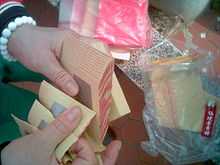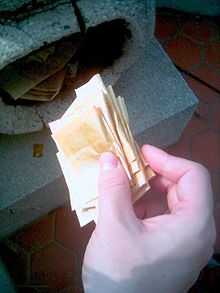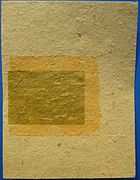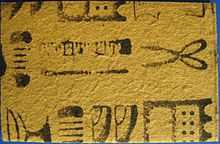Joss paper

Joss paper (simplified Chinese: 金纸; traditional Chinese: 金紙; pinyin: jīnzhǐ; literally "gold paper", Chinese: 陰司紙; pinyin: yīnsīzhǐ, Chinese: 紙錢; pinyin: zhǐqián, or simplified Chinese: 冥币; traditional Chinese: 冥幣; pinyin: míng bì; literally "shade/dark money" / Vietnamese: vàng mã in the North or giấy tiền vàng bạc in the South), also known as ghost money, are sheets of paper and/or paper-crafts made into burnt offerings which are common in traditional Chinese religious practices including the veneration of the deceased on holidays and special occasions. Joss paper, as well as other papier-mâché items, are also burned in traditional Chinese funerals, to ensure that the spirit of the deceased has lots of good things in the afterlife.
Traditional

Joss paper is traditionally made from coarse bamboo paper, which feels handmade with many variances and imperfections, although rice paper is also commonly used. Traditional joss is cut into individual squares or rectangles. Depending on the region, Joss paper may be decorated with seals, stamps, pieces of contrasting paper, engraved designs or other motifs.
Different types of spirit money are given to distinct categories of spirits.[1][2][3][4] The three main types of spirit money are cash (also known as copper), silver and gold. Cash monies are given to newly deceased spirits and spirits of the unknown. Gold spirit money (jin) is given to both the deceased and higher gods such as the Jade Emperor. Silver spirit money (yin) is given exclusively to ancestral spirits as well as spirits of local deities. These distinctions between the three categories of spirit money must be followed precisely to prevent confusion or insult of the spirits.
|
Contemporary
More contemporary or westernized varieties of Joss paper include Hell Bank Notes, paper credit cards, cheques, as well as papier-mâché clothes, houses, cars, toiletries, and servants (together known as Mandarin zhǐzhā zh:紙紮). The designs on paper items vary from the very simple to very elaborate (with custom artwork and names). In some Chinese mythology, Hell Bank Notes are sent by living relatives to dead ancestors as a tribute to the King Yanluo for a shorter stay or to escape punishment, or for the ancestors to use themselves in spending on lavish items in the afterlife.
Hell money notes is a modern form of spirit money. The word "hell" may have been derived from:
- What was preached by Christian missionaries, which told the Chinese that non-Christians go to hell when they die.
- A translation of the word "hell" that matches the pre-existing Chinese concept of "underground hold/court," which in Taoist cosmology had been considered the initial destination of the soul of the dead regardless of his or her virtue during life.
Hell money notes are known for their outrageous denominations ranging from $10,000 to $5,000,000,000. The bills feature an image of the Jade Emperor on the front and the "headquarters" of the Bank of Hell on the back. Another common feature is the signature of both the Jade Emperor and the King of Hell.
In 2006, in response to the burning of "messy sacrificial items" according to Dou Yupei, China's deputy minister for civil affairs, the ministry intended to ban at least the more extreme forms of joss paper.[5]
|
Use

Spirit money is most often used for venerating those departed but has also been known to be used for other purposes such as a gift from a groom's family to the bride's ancestors. Spirit money has been said to have been given for the purpose of enabling their deceased family members to have all they will need or want in the afterlife. It has also been noted that these offerings have been given as a bribe to Yanluo to hold their ancestors for a shorter period of time.

Venerating the ancestors is based on the belief that the spirits of the dead continue to dwell in the natural world and have the power to influence the fortune and fate of the living. The goal of ancestor worship is to ensure the ancestor's continued well-being and positive disposition towards the living and sometimes to ask for special favours or assistance. Rituals of ancestor worship most commonly consist of offerings to the deceased to provide for their welfare in the afterlife which is envisioned to be similar to the earthly life. The burning of spirit money enables the ancestor to purchase luxuries and necessities needed for a comfortable afterlife.

Many temples have large furnaces outside the main gate to burn joss paper. Folding the paper is an important part of the burning ceremony as it distinguishes joss paper from actual money. Burning actual money would be untenable for most people, and is also considered unlucky in Asian cultures. The Joss paper may be folded into specific shapes which are meant to bring on good luck and people tend to burn lavish amounts to ensure that the offering is well received.
Every fifteen days business owners in Taiwan burn spirit money in red braziers and set out offering tables on the sidewalk for both Gods and ghosts. This coincides with an ancient calendrical system divided into twenty-four fifteen day periods.
Due to environmental concerns, contemporary Joss paper burners have now been fitted with a special cover which eliminates the spread of burning ashes. The cover allows enough oxygen in to ensure that all of the offering are completely burned.
Spirit money is most commonly burned, but may also be offered by being held into the wind or placed into the deceased's coffin at funeral ceremonies.
Depending on the type and status of the deity being worshiped, paper with metal foil or with ink seals of various sizes may be burned. Different regions of the world have preferences on the type of Joss paper that is used. For instance, Hell Bank Notes are commonly found in regions where Cantonese populations dominate but are rarely seen or used in places such as Taiwan or Macau, which use "gold paper". The Joss paper is folded in half, or bought pre-folded into a shape of gold ingots before being burned in an earthenware pot or a specially built chimney. Joss paper burning is usually the last performed act in Chinese deity or ancestor worship ceremonies. The papers may also be folded and stacked into elaborate pagodas or lotuses.
In Taoist rituals, the practice of burning joss paper to deities or ancestors is acceptable. However in Buddhism, particularly in the Pure Land Buddhist tradition, the practice of burning joss paper to the deceased is generally discouraged, though it depends on cultural traditions when joss paper is burned in Buddhist ceremonies. However, the deceased would have no use for material items upon entering the Pure Lands or any realm after death, and that by not burning joss paper would also help conserve paper used to print it, as well as to save time, money, and the environment.
See also
| Wikimedia Commons has media related to Joss paper. |
| Wikimedia Commons has media related to Ritual furnaces. |
- Ancestor worship
- Ghost
- Ghost Festival
- Hell money
- Joss house
- Joss (god)
References
- Adler, J. (2002). Chinese Religious Traditions. London: Laurence King Publishing, Ltd.
- Asian Joss Paper: Rubber Trouble. Retrieved October 23, 2008 from http://rubbertrouble.com/joss.php http://go1ogle.com
- Burning of Joss Paper. Retrieved October 23, 2008 from http://app.nea.gov.sg/cms/htdocs/article.asp?pid=720
- Feuchtwang, S. (2001). Popular Religion in China. Surrey: Curzon Press.
- Gates, H. (1987, July). Money for the Gods. Modern China, 13(3), 259-277. Retrieved from JSTOR database.
- Hell bank notes - Library - Collection - Studio - Collectors Software. Retrieved October 23, 2008 from
- Joss Paper. Retrieved October 24, 2008 from http://www.nationsonline.org/oneworld/Chinese_Customs/joss_paper.htm
- Seaman, G. (1982 Fall). Spirit Money: An Interpretation. Journal of Chinese Religions.
- Thompson, L. (1989). Chinese Religion. Belmont, California: Wadsworth Publishing Company.





